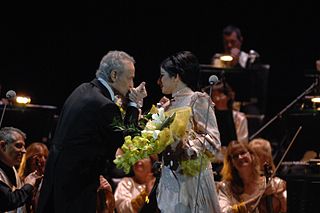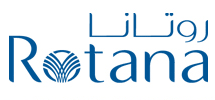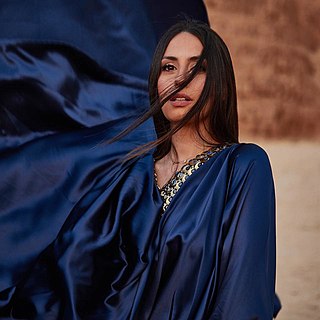Related Research Articles
Charbel Rouhana is a Lebanese oud player. Born in 1965 in Amsheet, a town north of Beirut, Charbel pursued his music education at the Université Saint-Esprit de Kaslik, obtaining his diploma in oud instrumentation in 1986 and his M.A. in Musicology in 1987.

Najwa Karam is a Lebanese singer, songwriter, and fashion icon. Known as "The Sun Of Lebanese and Arabic Song", she has created her style which blends traditional and contemporary Arabic music and has helped spread the Lebanese dialect in Arabic music. Najwa Karam was the highest-selling Middle Eastern artist in 1999, 2000, 2001, 2003, 2009, 2011, and 2017. She has known for her vocal powerhouse Mawwal talents and has gained an international audience due to her distinct blend of traditional Lebanese music and contemporary sounds.

Majida El Roumi Baradhy is a Lebanese soprano singer. She is also a UN Goodwill Ambassador. In 1974, she was a contestant in the talent show Studio El Fan on Télé Liban and performed songs by Asmahan and Layla Murad at the age of 16.

Arab cinema or Arabic cinema refers to the film industry of the Arab world which depends for most of its production on the Egyptian cinema.
Despite the nation being torn apart by civil war, Iraqi football in 2007 went as scheduled for the most part. Iraqi clubs participated in international competition, the Olympic team went through qualifications, and the national team played in different tournaments. No games by the national team or the Iraqi clubs were played in Iraq due to violence.

Omar Bashir is an Iraqi-Hungarian musician. His father, Munir Bashir, was considered to be the supreme master of the Arab maqamat scale system.

Hiba Al Kawas is a Lebanese operatic soprano, composer, and academic.
Abdel-Halim Caracalla is the founder and the artistic director of the Lebanese dance company Caracalla Dance Theatre, a company which would evolve into the first and most prominent dance theatre of the Middle East, creating a new language based upon the disciplines of western technique intertwined with the identity, movement and traditions of Arab cultural heritage.

Rotana Hotel Management Corporation PJSC is a hotel management company in the Middle East, Africa, and the Balkans. It has a portfolio of over 100 properties in 26 cities and operates five sub brands which include Rotana Hotels & Resorts, Centro Hotels by Rotana, Rayhaan Hotels & Resorts by Rotana, Arjaan Hotel Apartments by Rotana., and The Residences by Rotana.

Hiba Michel Tawaji is a Lebanese singer, actress, and director. Since 2008, she established herself in the Lebanese and Arab music scene as a major artist recognized for her vocal skills. She has a 4-octave vocal range.

Zena Assi (1974) is a Lebanese multidisciplinary artist.

Teta, Alf Marra is a documentary film about a feisty Beiruti grandmother.
Oussama Al Rahbani is a Lebanese musician and composer. He is the son of the Lebanese composer, musician and poet Mansour Rahbani.
Joseph Azar is a Lebanese artist, solo singer, and renowned performer in Lebanese musical comedies and theatre.
Mouna Bassili Sehnaoui is a Lebanese painter, writer and artist.